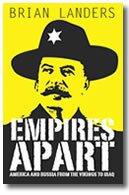Empires Apart: the American & Russian Empires from the Vikings to Iraq by Brian Landers
 The problem with writing about history is that there are rarely neat start and end points. I decided to start Empires Apart at the Battle of Châlons in 451 but I could have chosen dozens if nor hundreds of other dates. The problem is worse if you want to bring the story up to modern times because there is always something happening right now that you feel ought to be included.
The problem with writing about history is that there are rarely neat start and end points. I decided to start Empires Apart at the Battle of Châlons in 451 but I could have chosen dozens if nor hundreds of other dates. The problem is worse if you want to bring the story up to modern times because there is always something happening right now that you feel ought to be included.
Empires Apart tells the story of the American and Russian Empires and the events in Georgia over the last few weeks obviously warrant inclusion. But how? To add a few sentences or paragraphs on to the end might make the events appear as something altogether new when the whole point is that they are merely the latest manifestations of ages old tendencies.
On the American side there is the quest to control the world’s oil supplies. Perhaps I should amend the section in my book which deals with President Franklin Roosevelt’s meeting with the Saudi King in the middle of the Second World War. Roosevelt had flown to meet the king after his meeting with Stalin and Churchill at Yalta, just across the Black Sea from Georgia. The secret wartime meeting had made concrete American imperial designs in the Middle East. Roosevelt agreed to provide military assistance to the Saudi monarch in return for access to oil; the situation in Georgia today has remarkable similarities. But lots of other people are already pointing to the importance of oil in the Georgia dispute; I should try to find a less obvious angle.
From the very beginning the aggrandizement of America has been largely driven by the desire to gain resources belonging to others. But equally important, I believe, is the American conviction, going right back to the first New England Puritans, that their ideology is superior to all others. Perhaps I should approach the Georgia issue by discussing the way that American neo-conservative ideologues have infiltrated Georgian politics and got their man elected as President.
Or perhaps I should just concentrate on American opposition to Russian power and draw the obvious parallel with Hungary in 1956 when the CIA and others urged Hungarians on with promises of support that evaporated when the Russian tanks rolled in.
On the other hand I could concentrate not on American actions but on Russian: straight forward, old fashioned imperialism. Russia has regarded Georgia as part of its empire for two centuries. The dismemberment of the Russian empire at the end of the Cold War did little to change Russia’s underlying imperial ideology. Putin is clearly determined to recreate the Empire Yeltsin lost and the antics of the Georgian leaders President Bush had hoped would act as America’s proxies in the region gave him the excuse to act. Putin’s imperial policy reminds me of a phrase from an unlikely source and that I decide is the hook I am looking for.
Robert Kagan is a right wing ideologue who was part of President Reagan’s team at the time of the US invasion of the tiny island nation of Grenada. He is not a man I would normally warm to but he has written a very good book on American imperial history, although that is not a term he would be likely to use. Writing about the American purchase of Louisiana, violent conquest of Florida and opportunistic acquisition of Pacific coastline in the first two decades of the nineteenth century, Kagan noted the paradox that “American leaders had a clear vision of a continental empire” but “had no specific plans to obtain it”. Imperial expansion in the period he characterized as “determined opportunism”. It is a marvelous expression and one that seems to fit Putin perfectly.
Today’s Russian leaders are looking for opportunities to recreate their imperial sphere of influence whether in Estonia or Georgia or somewhere in between. They know what they want to do but not necessarily how, when and where the opportunities will arise. Just as America knows it wants to encircle Russia to maximize its imperial sphere of influence without knowing exactly how, when and where it will gain its next foothold.
That’s settled. I will stop this blog now and go back to my manuscript and develop the theme that the way America grew by opportunistically conquering neighbouring peoples in the eighteenth and nineteenth centuries is the way both America and Russia have always acted and continue to act. By doing so I will illustrate their and my determined opportunism.